Sunday Feb 22, 2026
Sunday Feb 22, 2026
Thursday, 21 March 2024 03:39 - - {{hitsCtrl.values.hits}}
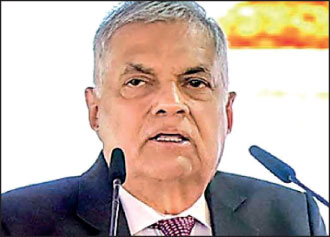
Significant silence on elections
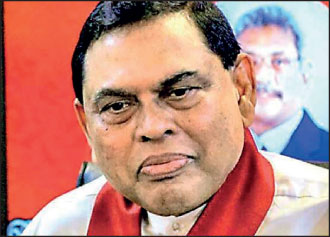
Basil’s basic instinct
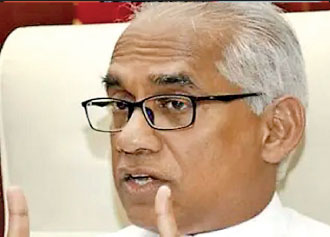
Eran’s egregious error exhibition
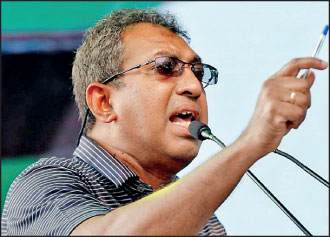
Making Lanka, California!
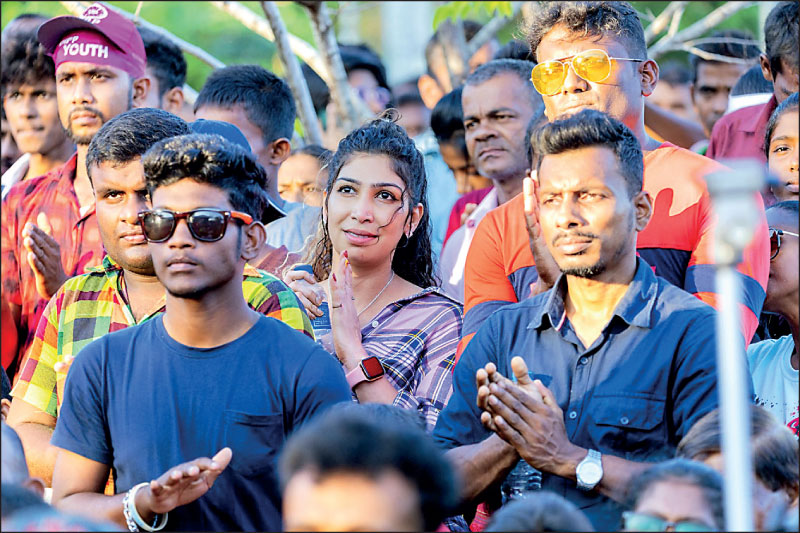
NPP Youth, Matar
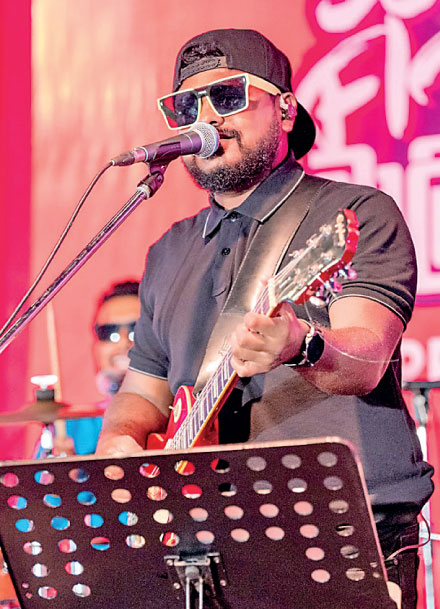
Trendier than SJB: NPP Youth, Matara
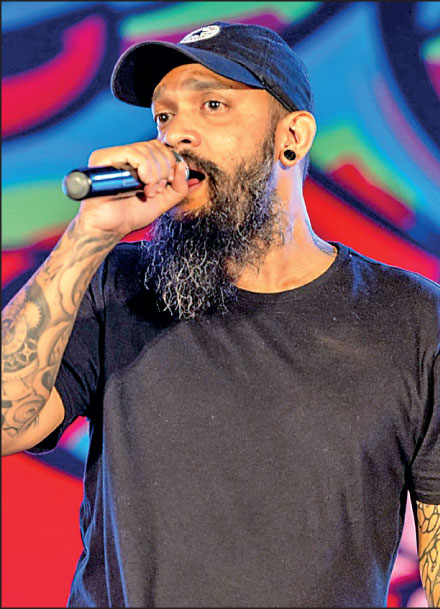
Indrachapa Liyanage, NPP rally, Matara
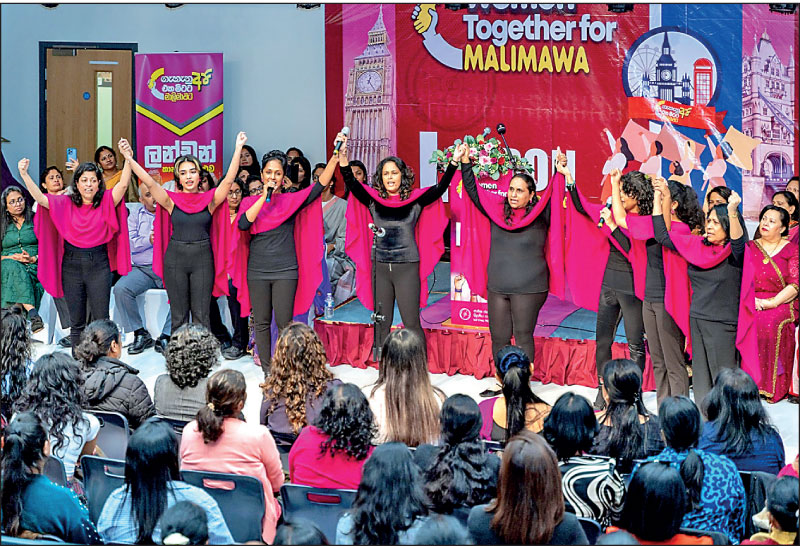
NPP Women, London
“…Fulfilling the California dream…the basic principles of the program of making Lanka, California…are already with us…”
- Dr. Harsha de Silva, SJB Youth Convention, Kurunegala, 16 March 2024 -
(https://www.facebook.com/harshadesilvamp/videos/785148866842109)
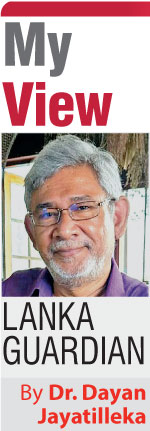 President Wickremesinghe’s first public political rally at Kuliyapitiya was odd. He delivered a zestful, even rollicking speech, remaining in the high spirits he displayed in the Mustang’s tent at the Royal-Thomian Big Match. He was rude and crude about his former lecturer at Colombo’s Faculty of Law, Prof. G.L. Peiris. He praised his pet members of the SJB, Dr. Harsha de Silva and Eran Wickramaratne. He insulted SJB leader Sajith Premadasa while pitching for the SJB to join him. He lavished praise on himself. A vintage Wickremesinghe performance, it elicited no praise outside the (small) UNP.
President Wickremesinghe’s first public political rally at Kuliyapitiya was odd. He delivered a zestful, even rollicking speech, remaining in the high spirits he displayed in the Mustang’s tent at the Royal-Thomian Big Match. He was rude and crude about his former lecturer at Colombo’s Faculty of Law, Prof. G.L. Peiris. He praised his pet members of the SJB, Dr. Harsha de Silva and Eran Wickramaratne. He insulted SJB leader Sajith Premadasa while pitching for the SJB to join him. He lavished praise on himself. A vintage Wickremesinghe performance, it elicited no praise outside the (small) UNP.
What was odd was the absence of one word in Ranil’s speech: ELECTION. He didn’t mention the imminent Presidential election. He didn’t say this was an election year. He didn’t ask for a vote. He didn’t spell out what it would mean for the country were he to be popularly elected to the presidency for the first time ever.
Did he forget? Or hasn’t he decided whether or not to contest? Or whether or not to hold a Parliamentary election before the Presidential election? Or whether or not to try to impede/ circumvent the holding of the Presidential election?
The aim of Ranil’s aggressive speech was to bring sufficient pressure to bear on Sajith Premadasa to make him capitulate and be coopted under Ranil’s leadership into a realignment of the SJB and UNP, or split the SJB and secure a shard.
Why the leader of the SJB and the Opposition should consider any arrangement even fleetingly under Ranil’s leadership when the latter has no electoral base, is running below double-digits in successive polls, and holds the presidency unelected and exclusively due to the Rajapaksa-led SLPP in Parliament, is a riddle.
Malimawa’s ex-military
Perhaps Ranil is still hoping use a ‘Jayawickrama & Dep’ filibuster-- an ‘abolition’ amendment and electoral reform/re-delimitation-- and therefore did not wish to commit himself publicly to an election in his Kuliyapitiya speech.
As it was, the Kuliyapitiya speech sounded Ranil’s effort to build a political front which can reunify the political Establishment, reassure the socioeconomic elite (the superrich “1%”) of continuity and provide the military and bureaucracy with a political backstop for any effort by him to forestall the Presidential election.
Wickremesinghe is parentally predisposed to self-destructive political risk. His parents’ confrontationist stance vis-à-vis Sirimavo Bandaranaike’s SLFP-led coalition resulted in the State swallowing (and never regurgitating) the magnificent newspaper empire founded by Ranil’s illustrious grandfather D.R. Wijewardena. As Editor, Ceylon Daily News, and Editor-in-Chief, my father Mervyn de Silva had urged greater caution and balance, while supporting the diplomatic young Chairman of Lake House, Ranil’s uncle, but a reckless, aggressive sense of entitlement prevailed with catastrophic structural consequence. It could happen again.
Expectations of adherence to civilised convention and civic conduct by Wickremesinghe would be misplaced. President Premadasa’s second-in-command and UNP General-Secretary Sirisena Cooray passed-up the Prime Ministership after Premadasa’s assassination in 1993 urging President Wijetunga to give it to Ranil, which he did. Cooray also gifted Ranil the post of UNP organiser for Colombo Central, a slot he had held as successor to Premadasa when the latter became President. Ranil repaid him by never giving him a post in the UNP, telling Cooray to obtain UNP membership first. Cooray pointedly replied he had life membership, having joined the UNP at age 16.
In 1997, when Chandrika detained Cooray on trumped-up charges, scornfully dismissed with costs by the Supreme Court presided over by Justice Mark Fernando, Ranil didn’t campaign against or criticise the incarceration of the UNP’s former General-Secretary. Instead, he strove to sabotage the Premadasa commemoration that Sirisena Cooray, Chairman of the Premadasa Center had organised. As Executive Director I filled-in, publicly presenting the Center’s research report at the Sugathadasa Indoor Stadium.
Thus, Presidential election 2024 cannot be left to Ranil’s good sense or goodwill. Any obstructive or dilatory move by him has to be deterred, or countervailed and neutralized. If he freezes/circumvents elections, a wholly legitimate (says John Locke) insurrection and democratic revolution against illegitimate and illegal rule can conceivably be avoided if the NPP’s expanding auxiliary of war veterans (‘Aditana’) at district level successfully appeals to the serving military not to follow illegal orders and instead join (with their weapons) the side of the sovereign people.
Basil’s banalities
Basil Rajapaksa recently observed that holding a parliamentary election before the presidential election is desirable because it can forestall the inevitable domino effect of a presidential election victory on a subsequent parliamentary election, which yields an unhealthy monopoly of power in the hands of one party and person. His epiphany probably has another origin, namely the expectation that the non-NPP parties can do better at a snap election than at any other, and the NPP will do less impressively at a parliamentary election than at a Presidential, enabling a Pakistan-like coalition government of the unlikeliest, most opportunistic partners to keep the JVP-NPP at bay.
Basil says two parties have nationwide organisational networks: the SLPP and the JVP (an old-fashioned guy, he never says NPP). Two parties have a mass base: SLPP and SJB. The UNP has one asset: a credible Presidential candidate. But if Basil really believed that, shouldn’t he want a Presidential election ahead of the parliamentary? The fact that he doesn’t, indicates he’s unsure.
The SLPP may have a presence throughout the country, but cannot revive its vote-base for two reasons:
1. Gotabaya Rajapaksa’s decimation of peasant harvests (by 60%) and incomes, and therefore the peasant base of the SLPP/Rajapaksas for a generation.
2. The SLPP’s choice of Ranil over Dullas as President; a President whose destruction of the public sector and rampant economic foreignisation cuts against the grain of the SLPP.
The SLPP can deliver sitting MPs but cannot deliver votes for Ranil. Center-left nationalist-populist voters would rather slide leftwards to the NPP than pivot to their traditional rightwing, anti-national, UNP hate-symbol, Ranil Wickremesinghe.
Basil uses as his reference point for estimating the JVP-NPP, Rohana Wijeweera’s hugely-attended public events and contrastingly poor electoral performance in October 1982. He mirrors exactly the ruling UNP’s inability in 1956 to grasp two realities:
a. What had happened at the level of social consciousness in and through the Hartal of August 1953. Today’s equivalent is Aragalaya 2022.
b. What was happening at the ideological and sociopolitical level with SWRD’s ‘Pancha Maha Balavegaya’. Today’s equivalent is the NPP, especially its Women’s and Veterans’ formations.
Alongside Gotabaya’s mendacious memoir, Basil’s project of marketing Ranil displays the corrosive decomposition of Mahinda Rajapaksa’s brothers. None of their famous forebears would have thought of supporting Sir John Kotelawala in 1956. They inflicted a historic defeat on him, the UNP, and the social interests it represented (Martin Wickramasinghe’s “Bamunu Kulaya”).
Contrary to Basil, there are just two parties with both a mass base and a widespread if uneven, competing presence: the JVP-NPP and the SJB. There are three leading personalities, though: Anura and Sajith with an organised popular base, and incumbent Wickremesinghe hovering in mid-air like Baron Harkonnen in Dune.
Why should Sajith Premadasa who is running ahead of his party in opinion polls, concede an advantageous Presidential contest and consent to a snap Parliamentary election?
Basil just can’t sell Ranil to the electorate. No one ever could at a Presidential election (1999, 2005) and certainly no one can in a context of awful, accelerating economic privation. The shocking fact revealed by the Advocata Foundation’s research, namely that 40% of women between the ages of 15 and 47 have stopped their habit of wearing sanitary napkins because it costs 4,500 rupees a year, and use cloth rags instead, should tell us the extent of the social collapse underway and the sheer misery and despair around us. Why would the socioeconomic majority opt for the status quo? Collective masochism?
If the economy is doing sufficiently well under Ranil, then how come educated Sri Lankans returned to Sri Lanka after Mahinda won the war, rose rebelliously against Gotabaya’s capricious autocracy, flew in from overseas to join the Aragalaya, but have been fleeing the country in unprecedented numbers under Ranil?
If AKD is ‘Kaiyyanayaka’, what’s Harsha?
The JVP-NPP’s main ideological rival, Dr Harsha de Silva’s intemperate insults (https://youtu.be/kVTwrSo-8kg) sound like he has not recovered from a bad Big Match hangover. He seems determined to lock the SJB and NPP-JVP into an agreement with the private international bondholders, even before these parties ascertain the people’s wishes and obtain a mandate at an election.
Vast numbers of Greeks chanted in Athens’ Syntagma square: “this is not our debt!” Sri Lanka’s debt trap is essentially an ISB trap (Prof Howard Nicholas); most of the ISB debt was incurred by the UNP administration of which Harsha was an economic team-member (2015-2019); and the SJB Economic Council still defend that massive borrowing. So, what’s really going on here?
Addressing the SJB Youth convention in Kurunegala, March 16th, Harsha pledged that an SJB administration would “turn Sri Lanka into a California”. As the footage shows, nobody cheered when he concluded with that punchline. It is the silliest slogan I remember in 60 years of consciously observing Sri Lankan politics.
The SJB attacks AKD as “Kaiyyanayaka” (leading braggart), a juvenile pun on his surname, warning against “another Gotabaya 2019”, and urging voters to eschew utopian rhetoric in favour of practical, tangible, proven improvements such as Sajith’s laudable ‘Sakvala’. How then to classify the SJB’s hallucinatory shadow Finance Minister who assures that they “already possess a program to make Sri Lanka, California”?
In this birth centenary year, Sajith Premadasa and his “splendid team” (“istharam kandaayama”) should be pledging to implement President Premadasa’s unfinished dream of ‘political, economic and social democracy’ for Sri Lanka. At age 18, Ranasinghe Premadasa founded a monthly magazine called SWADESHAYA (Native Land). He remained a passionate patriot until his death. If Harsha and Eran co-founded a monthly magazine, it would probably be called VIDEYSHAYA (Foreign Land).
We don’t need a government whose dream is not a Sri Lanka dream at all, but an American, South Indian or Chinese dream. We need a government dedicated to making Sri Lanka the best version of itself it can possibly be; not another California. No serious economist, only a crank or clown, would think the latter feasible. We need a new Sri Lanka which optimises its potential, retains its identity, maximises its strategic autonomy.
Existential danger and Eran’s errors
Eran Wickramaratne accuses the JVP of the Original Sin of “bringing the Rajapaksas to power in 2004-2005”. (https://www.youtube.com/watch?v=B5jRN64bEzA).
In 2004 Ranil’s UNP, having been dismissed by Chandrika in late 2003, contested the Parliamentary election and lost. CBK (not Mahinda) won with the JVP’s support. Mahinda Rajapaksa was elected president in 2005.
By 2004, President Chandrika Kumaratunga and her advisor Lakshman Kadirgamar (LK) had flown to Delhi to brief Prime Minister Manmohan Singh and his team about the strategic danger to Sri Lanka and India of the buildup of LTTE artillery overlooking Trincomalee harbour that Prime Minister Ranil Wickremesinghe had permitted and facilitated through his dangerously lopsided ceasefire agreement (CFA) with Prabhakaran which Kadirgamar had ripped apart in Parliament (and published in the Sunday Times). CBK and LK took with them the report prepared by the US Pacific Command which spoke to this danger (and recommended cluster bombs as a solution). Ranil had buried the PACOM report, which was then leaked to Kadirgamar and the Sunday Times.
For its part, in 2002, shortly after the CFA was signed, Delhi cross-posted its doveish, pro-CFA High Commissioner in Colombo, Gopalakrishna Gandhi, to Oslo, and inducted the stellar Nirupam Sen from Oslo as High Commissioner. Sen had been Deputy High Commissioner in Colombo the late 1980s. A dazzlingly articulate and literate left-leaning diplomat (whose father headed one of India’s intelligence agencies) Sen found it easy to reestablish contacts with the JVP. Nirupam Sen went on to be India’s Perm Rep at the UN, beating Japan in the vote for the Security Council chair.
I was there when Nirupam Sen told Lakshman Kadirgamar “Lakshman, we warned you about the Norwegians”, to which Kadirgamar replied “Nirupam, it was either them or Gareth Evans, and Australia would have been too big for us to manage”.
Lakshman Kadirgamar and Nirupam Sen worked out the strategy and the broad coalition incorporating the JVP, that enabled Chandrika to turf-out Ranil. On a separate track, Anura Bandaranaike and Mangala Samaraweera played intermediary/negotiating roles. General Sarath Fonseka, SF commander Jaffna, would visit in civvies to brief Kadirgamar after nightfall. I was parked in an adjacent room. As Mrs. Kadirgamar could confirm, LK would have me dropped back at home around 3 AM after our long conversations.
The Godfather of the economically moderate JVP we see today was Lakshman Kadirgamar. Back as Foreign Minister (2004-2005) he sent top JVP teams to China for education by the Communist Party of China in late-modern, post-Deng Xiaoping economics. Kadirgamar, whose portrait was hung at Balliol in his lifetime, had an avuncular fondness for the post-Wijeweera JVP, spotting their national and democratic potential, and consciously grooming them to assume the role they are stepping into now.
Everything I have said here can be verified by conversation with ex-President Kumaratunga.
In 2004-2005 the main issue was the existential danger that had he remained in office or won the election, Ranil Wickremesinghe would sign the Interim Self-Governing Authority Agreement (ISGA) with Prabhakaran. The UNP’s SB Dissanayake and Rajitha Senaratne had returned from the Wanni after talks with the LTTE and plastered the nation’s walls with posters demanding “the immediate implementation of the ISGA”.
In 2024, Eran and the SJB denounce the JVP for defeating Ranil in 2004-2005. The choice of Mahinda in 2005 proved historically correct: he defeated Prabhakaran’s LTTE as JR Jayewardene, Ranasinghe Premadasa, DB Wijetunga, Chandrika Kumaratunga and Rajiv Gandhi had failed to, thereby ending a Thirty Years War.
The 2005 Presidential election was in the shadow of Prabhakaran’s assassination of Foreign Minister Lakshman Kadirgamar under cover of the cease-fire. Mahinda made a steely speech at the funeral.
I quit my visiting professorship at SAIS, Johns Hopkins, Washington DC, returned to Colombo and appeared on TV in support of MR in the 2005 presidential election campaign. Weeks later Charitha Ratwatte excoriated me saying his opinion research showed Ranil ahead until my TV appearances which --he alleged -- nudged the needle.
NPP youth rocks!
Harini Amarasuriya starred at the breakout NPP Women’s gathering in London. This wasn’t the Gota brigade of Sinhala-Buddhist Sarah Palins and Nikki Haleys, nor mainly JVP emigres from the 1980s.
The SJB and NPP kicked-off youth rallies in Kurunegala and Matara respectively. SJB Youth got Rookantha Gunathilake. Lilting lullabies of vapid pop.
The NPP Youth platform had Indrachapa Liyanage, heavily inked, plugged-in, vibing with and rapping for the Aragalaya generation.
Check out Indrachapa, starting 3:50.
(https://www.youtube.com/watch?v=84MQRfiDweo&t=13768s)
Maybe it won’t be North Korea after all.